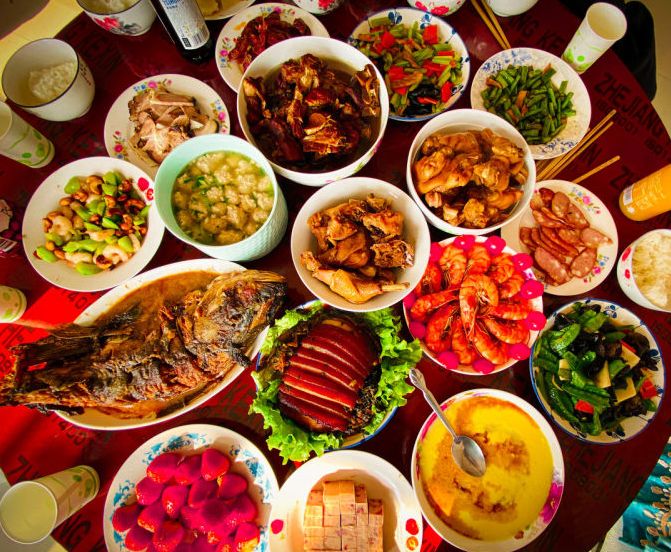A reunion dinner (nián yè fàn) is held on New Year’s Eve during which family members gather for a celebration. The venue will usually be in or near the home of the most senior member of the family. The New Year’s Eve dinner is very large and sumptuous and traditionally includes dishes of meat (namely, pork and chicken) and fish. Most reunion dinners also feature a communal hot pot as it is believed to signify the coming together of the family members for the meal. Most reunion dinners (particularly in the Southern regions) also prominently feature specialty meats (e.g. wax-cured meats like duck and Chinese sausage) and seafood (e.g. lobster and abalone) that are usually reserved for this and other special occasions during the remainder of the year. In most areas, fish (鱼; 魚; yú) is included, but not eaten completely (and the remainder is stored overnight), as the Chinese phrase “may there be surpluses every year” (年年有余; 年年有餘; niánnián yǒu yú) sounds the same as “let there be fish every year.” Eight individual dishes are served to reflect the belief of good fortune associated with the number. If in the previous year a death was experienced in the family, seven dishes are served.
Other traditional foods consists of noodles, fruits, dumplings, spring rolls, and Tangyuan which are also known as sweet rice balls. Each dish served during Chinese New Year represents something special. The noodles used to make longevity noodles are usually very thin, long wheat noodles. These noodles are longer than normal noodles that are usually fried and served on a plate, or boiled and served in a bowl with its broth. The noodles symbolize the wish for a long life. The fruits that are typically selected would be oranges, tangerines, and pomelos as they are round and “golden” color symbolizing fullness and wealth. Their lucky sound when spoken also brings good luck and fortune. The Chinese pronunciation for orange is 橙 (chéng), which sounds the same as the Chinese for ‘success’ (成). One of the ways to spell tangerine(桔 jú) contains the Chinese character for luck (吉 jí). Pomelos is believed to bring constant prosperity. Pomelo in Chinese (柚 yòu) sounds similar to ‘to have’ (有 yǒu), disregarding its tone, however it sounds exactly like ‘again’ (又 yòu). Dumplings and spring rolls symbolize wealth, whereas sweet rice balls symbolize family togetherness.
Red packets for the immediate family are sometimes distributed during the reunion dinner. These packets contain money in an amount that reflects good luck and honorability. Several foods are consumed to usher in wealth, happiness, and good fortune. Several of the Chinese food names are homophones for words that also mean good things.
Many families in China still follow the tradition of eating only vegetarian food on the first day of the New Year, as it is believed that doing so will bring good luck into their lives for the whole year.
Like many other New Year dishes, certain ingredients also take special precedence over others as these ingredients also have similar-sounding names with prosperity, good luck, or even counting money.
Post time: Jan-13-2023




